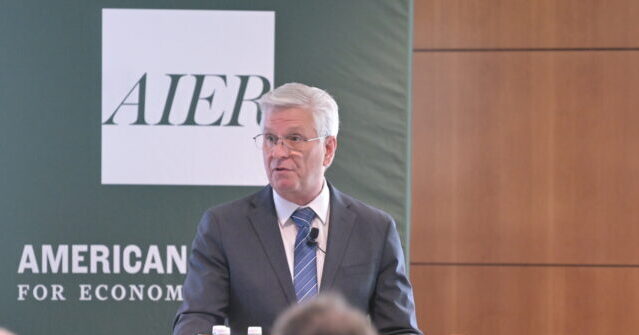Federal Reserve Governor Christopher Waller on Wednesday called for an immediate interest-rate cut, arguing that inflation is cooling and the labor market is weaker than it appears—bolstering the Trump administration’s case that the economy needs looser monetary policy despite recent tariff hikes.
Speaking at a Manhattan Institute event in New York, Mr. Waller said he supports a 25 basis point reduction in the federal funds rate at the central bank’s meeting later this month. He cited slowing economic growth, weakening private-sector job creation, and inflation readings that he described as close to target once the effects of tariffs are stripped out.
“I see enough evidence now to support a cut in the target range at the July FOMC meeting,” Waller said, adding that additional cuts later this year could be appropriate “if the data continue to point toward economic weakness and inflation continues to ease.”
He said the current stance of monetary policy is likely “restrictive,” with real interest rates estimated to be 125 to 150 basis points above neutral. “This degree of policy tightness was appropriate in 2022 and 2023,” Waller said. “But in my view, it is no longer warranted.”
Mr. Waller directly addressed the role of tariffs in recent inflation readings, arguing that they are unlikely to produce sustained price pressures. “Recent increases in tariffs are one-off increases in the price level and not a source of ongoing inflation,” he said. “If inflation expectations remain well anchored—and I believe they are—then standard monetary policy principles suggest we should look through these kinds of relative price changes.”
That analysis closely mirrors the Trump administration’s argument that tariffs may raise some prices temporarily but do not represent a persistent inflationary force. While Federal Reserve Chair Jerome Powell has emphasized inflation risks stemming from tariffs, Waller’s remarks suggest growing internal support at the Fed for a more dovish interpretation.
The economic backdrop, Waller argued, has shifted significantly from the conditions that justified higher rates in previous years. He said second-quarter GDP growth appears to have slowed to around 1 percent, with consumer spending and business investment showing signs of softening. “Growth in personal consumption expenditures has moderated,” he said. “While consumption was strong in early 2024, it has slowed substantially in recent months.”
On the labor front, Waller said that surface-level strength in employment data masks growing underlying weakness. He pointed to the June increase of just 74,000 private payroll jobs—well below typical monthly gains—and cautioned that “this figure likely overstates the underlying strength of job creation.” He also highlighted declining average weekly hours, a key early signal of labor market slack, and noted that wage growth has been slowing for more than a year.
“I believe the labor market is at or very near stall speed,” Waller said. He warned that if the Fed waits until September to cut rates, it may risk “falling behind the curve.”
Though he emphasized that he had not made a final decision and would consider upcoming data, Waller made clear that the current data flow supports action in July. “I believe the FOMC can and should cut the target range for the federal funds rate at the conclusion of our July meeting,” he said.
Markets interpreted the speech as a strong signal in favor of near-term easing. Traders increased bets on a July cut following the remarks, and Treasury yields dipped modestly.
Mr. Waller’s remarks also add to speculation about the future of Fed leadership. Chair Powell’s term expires in early 2026, and some in the Trump administration have been critical of the Fed’s reluctance to ease policy earlier. While Waller did not address personnel matters, his speech is likely to be viewed as more closely aligned with the White House’s view than recent comments from Powell or other officials.
“If the economy evolves as I expect,” Waller said, “then the case for cutting the target range for the federal funds rate is clear.”

















